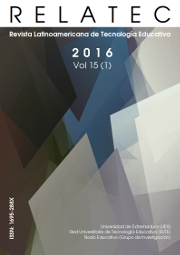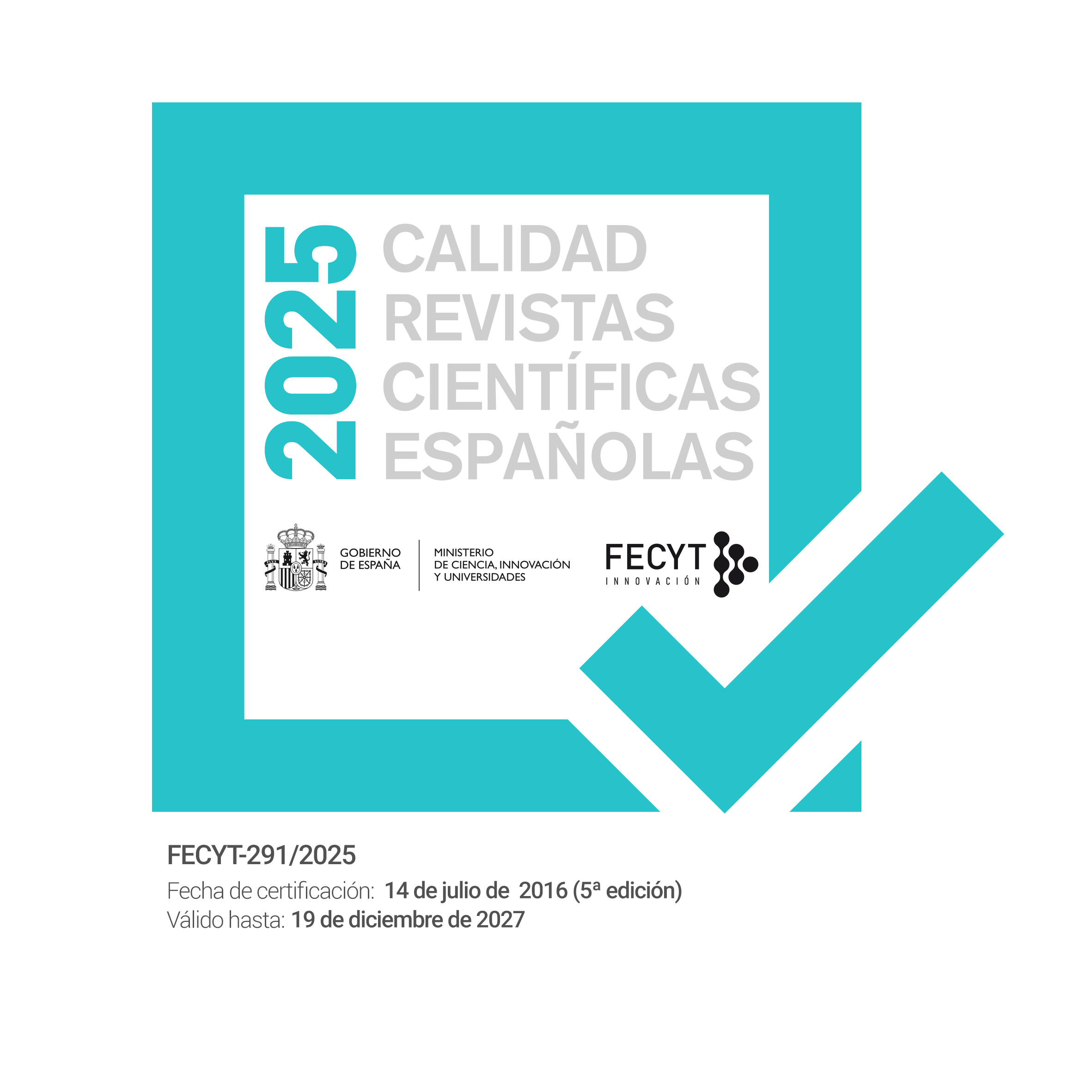Metodologías de trabajo colaborativo en la Educación Secundaria Obligatoria: un estudio de caso / Collaborative Work Methods in Compulsory Secondary Education. A Case Study
DOI:
https://doi.org/10.17398/1695-288X.15.1.75Keywords:
Aprendizaje activo, Tecnologías de la Información y la Comunicación, Estudio de caso, Innovación educacional, Tecnología Educativa.Abstract
Este artículo da a conocer una parte de la investigación que lleva por título «Aprendizaje colaborativo a través de las Tecnologías de la Información y Comunicación (TIC) en el contexto de la Escuela 2.0», financiada por el Ministerio de Ciencia e Innovación EDU2011-28071, y desarrollada entre los años 2012-2015 por el grupo de investigación GITE-USAL de la Universidad de Salamanca. En el contexto general de dicha investigación nos propusimos conocer las concepciones que los profesores de tercer ciclo de Primaria y primer ciclo de Educación Secundaria Obligatoria de centros de Castilla y León, con altas prestaciones tecnológicas, tienen sobre la metodología de aprendizaje colaborativo; las experiencias de trabajo colaborativo mediante las TIC que desarrollan en el aula, y las actividades de este tipo que realizan con otros compañeros, orientadas a su desarrollo profesional. En este trabajo, a través de una metodología de estudio de casos, llevado a cabo en un centro educativo de la Comunidad de Castilla y León, un Instituto de Educación Secundaria (IES) situado en la provincia de León, profundizamos en las características de los procesos que se generan en el aula con estas metodologías colaborativas. Y además comprobamos si dichas metodologías implican cambios en los resultados de aprendizaje, contemplando, además, las ventajas y los inconvenientes de este tipo de metodologías para los estudiantes.
Abstract
This article is part of the research entitled «Collaborative learning through the Information Technology and Communication (ICT) in the context of the School 2.0», funded by the Ministry of Science and Innovation EDU2011-28071 between the years 2012-2015 developed by the research group GITE-USAL University of Salamanca. In the general context of this research, we set out to identify the concepts that teachers in third cycle of primary and junior Secondary Education centers of Castile and Leon, with high technological features have on the methodology of collaborative learning; the experiences of collaborative work by developing ICT in the classroom, and activities of this kind engaged with others aimed at professional development. In this paper, through a methodology of studies, carried out in a school in Castilla y Leon, a secondary school located in the province of Leon, we look into the characteristics of the processes that are generated in the classroom with these collaborative methods. And we check whether these methods involve changes in learning outcomes also considering the advantages and disadvantages of this type of methodology for students.
Downloads
References
Cabezas, M. y Casillas, S. (2009). La Web 2.0: Contexto pedagógico y utilidades didácticas. Papeles Salmantinos de Educación, 13, 247-266.
Carranza, G. (2008). Docencia, discurso y evaluación colaborativa. Reencuentro, 53, 135-145.
Cebrián, M. (2008). La web 2.0 como red social de comunicación e información. Estudios sobre el mensaje periodístico, 14, 345-361.
Coll, C.; Maurí, T. y Onrubia, J (2008). Análisis de los usos reales de las TIC en contextos educativos formales: una aproximación socio-cultural. Revista Electrónica de Investigación Educativa, 10, 1-18.
De la Torre, A. (2006). Wededucative 2.0. Edutec, Revista Electrónica de Tecnología Educativa, 20. Recuperado de http://www.eductec.rediris.es/revelec2/revelec20/anibal20.htm
Freyman, A.; Collazos, V.A.; Padilla, N. y Ortiz, J. (2009). Análisis y monitorización de la interacción en entornos colaborativos mediante el uso de SNA. Revista Iberoamericana de Informática Educativa, 10, 37-43.
García-Valcárcel, A. y Hernández, A. (2013). Recursos tecnológicos para la enseñanza e innovación educativa. Madrid: Síntesis.
García-Valcárcel, A., Tejedor, J. (2010). Evaluación de procesos de innovación escolar basados en el uso de las TIC desarrollados en la Comunidad de Castilla y León. Revista de Educación, 352, 125-148.
García-Valcárcel, A., Basilotta, V. y López, C. (2014). Las TIC en el aprendizaje colaborativo en el aula de Primaria y Secundaria. Comunicar, 42, 65-74.
Glaser, B.G. & Strauss, A.L. (1967, 2012). The discovery of grounded theory: strategies for qualitative research. New York: Aldine Publishing Company.
Johnson, D., Johnson, R., Holubec, E. (1999). El aprendizaje cooperativo en el aula. Buenos Aires: Paidós.
Oktay, J.S. (2012). Grounded Theory. Oxford: Oxford UniversityPress.
Plomp, T., Voogt. J. (2009). Pedagogical practices and ICT use around the world: Findings from the IEA international comparative study SITES 2006. EducInfTechnol, 14, 285-292. Doi: 10.1007/s10639-009-9090-3
Salmerón, H.; Rodríguez, S. y Gutiérrez, C. (2010). Metodologías que optimizan la comunicación en entornos de aprendizaje virtual. Comunicar, 34, 163-171.
Suárez, C., Gros, B. (2013). Aprender en red: de la interacción a la colaboración. Barcelona: UOC.
Valverde-Berrocoso, J. Garrido-Arroyo, M.C. y Sosa-Díaz, M.J. (2010). Políticas educativas para la integración de las TIC en Extremadura y sus efectos sobre la innovación didáctica y el proceso enseñanza-aprendizaje. Revista de educación, 352, 99-124.
Downloads
Published
Issue
Section
License
Authors who publish in this journal accept the following conditions:
1. The Author retains copyright in the article. Upon acceptance of the article, the author shall grant to the Publisher the right of first publication of the article. with the dcoument registered with the Creative Commons Attribution-NonCommercial-NoDerivative 4.0 International (CC BY-NC-ND) license, which allows to third parties to use what is published whenever they mention the authorship of the work and the first publication in this journal.
2. Authors can make other independent and additional contractual agreements for the non-exclusive distribution of the article published in this journal (eg, include it in an institutional repository or publish it in a book) provided they clearly indicate that the work was published for the first time in this journal.
3. Authors are allowed and recommended to publish their work on the Internet (for example on institutional or personal pages) before and during the review and publication process, as it can lead to productive exchanges and a greater and faster diffusion of published work (see The Effect of Open Access).









